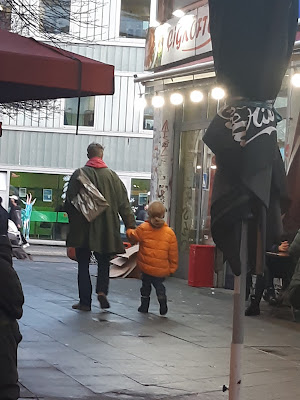In 2018 I was contracted by one of the larger houses in Germany working under a famous director. We were working with children in the cast, and, as part of the assisting staff for that show, sometimes we had to put on knee pads and walk around on our knees in the rehearsal room, pretending to be children for the lead actor during rehearsals while they were all at school. It's one of those weird, absurd things you only get to do in theatre - those type of surreal sitautions that are why we love the stage.
I was sitting off-stage watching my colleague strap on her kneepads, dwarfed by the bulky frame of the actor, surrounded by about 20 workers of the house: experienced stage designers, composers, and musical directors, of various genders. It was early in the process, and they had all gathered to check out rehearsals, meet each other, and chat about the work of their various departments. As they prepared for the next scene, with my colleague approximately waist-high to the actor, The Director offhandedly said:
"Brett, ready? Ok, let's go. Is Annika down ready to do what she does best? Ok, music, and let's go!"*
At the comment "ready to do what she does best", there was some nervous laughter from the surrounding workers of the show. I watched them closely. Had they just heard what I heard? Had I even heard it correctly? I turned to another colleague: did you just hear that? He nodded, smiling.
I tried to work out what to do. My colleague was 18 years old at this time. I was very much an outsider in this place, and the target of the attack was actually more of an insider of the institution. She had been part of the children's chorus of the theatre 1 year
earlier, and now was working inside its giant mechanism, as an adult
worker. She was German-speaking, and I think did not follow the "joke", which was in English, and spoken quickly, almost breezed over.
Later, we were cycling back, because she lived on the way to my place, a short distance from the theatre. As we were saying goodbye, I said to her,
"Hey, listen. I want to talk to you about something.
"Sure. What's up?
"Today, there was a joke made in rehearsals, when you were on your knees. Did you understand it?
"No.
"Ok. Do you want to know about it?
"Ok.
I explained to her in a dry, factual way that the joke was about her giving blowjobs, and being good at this. I explained to her that I thought this was "not ok", that it was abuse, and that I would support her if she wanted to take it further within the organisation. She seemed uncomfortable. "Ok, thank you. But I don't think I do." "Ok. Well just keep in touch about it if you want to. I support you." I said goodnight and cycled home.
--
About a month later during dress rehearsals, I was sitting alone behind The Director and the actor in the audience seating as they prepared a scene with the children's chorus, who were all women between 15 and 17. The children's chorus was hiding behind stage backdrops, and should appear at certain points in the music. But there was a problem: They couldn't see the actor, to know that he was there for their cue. The actor came into the audience seating of the grand house, and started talking to The Director about it in the dimly-lit auditorium. The Director suggested making some kind of verbal cue: a grunt or something. Then The Director said:
"Just grunt at them. That's all they're good for, isn't it? You just grunt and they... you know...".**
The actor, a 50-year old who I had seen during drinks with his arm around a different 19-year old colleague after rehearsals, gave a sort of "grimace-grin", seeming to acknowledge that the joke was "a bit risky". I looked around: was I the only one who had heard it this time? Yes. The actor went back onto the stage and grunted his way through the rest of the scene. I sat behind The Director, shadowing him, thinking about what to do.


